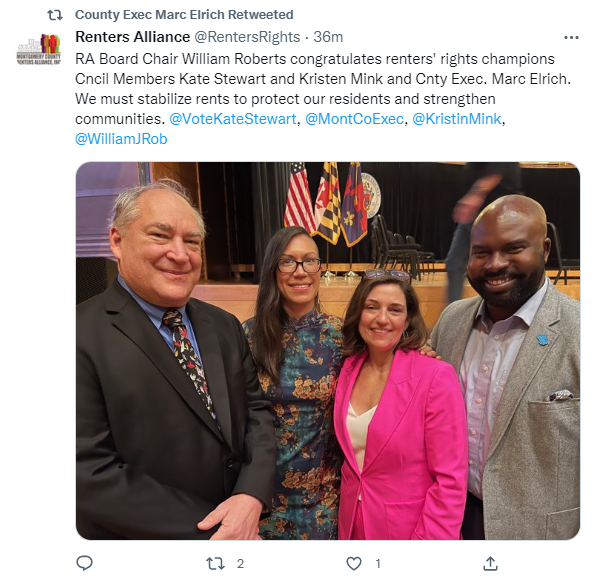By Adam Pagnucco.
In the wake of County Executive Marc Elrich’s inauguration speech, in which he vowed to pass rent control, it’s reasonable to ask whether the county council would enact it. On the incoming 11-member council, I count four votes – at least – in favor of rent control.
Will Jawando
Jawando is the county’s primary champion of rent control. He introduced and passed two bills providing for temporary rent control during the pandemic and advocated for a third that has not yet received a vote. He also introduced another bill that would have established permanent rent control near transit stations. That one also did not receive a vote. Jawando shows no sign of giving up on the issue and now he has allies.
Natali Fani-Gonzalez
The new District 6 council member told Our Revolution:
I have advocated for rent stabilization during the ongoing pandemic and will continue to do so. I do believe we need to protect low income communities from displacement due to high rents. Any type of rent stabilization program must only target low income communities that could be displaced due to rent prices because they live near key infrastructure like BRT, metro and purple line. Also, it should be structured in a way that we deal directly with the landlord, avoiding asking tenants to fill out long-forms which make the process more bureaucratic. I think the government, now more than ever, has a significant responsibility of ensuring families don’t end up homeless or moving to places far away from their jobs due to rent prices.
Kristin Mink
The new District 5 council member told Our Revolution:
Every eviction is a policy failure. We need to plug some holes in our current, temporary rent stabilization legislation so that when we push for permanent legislation, there’s already a precedent.
Additionally, Mink called for “greater renter protections, including county-wide rent stabilization and Just Cause Eviction Protections, and assistance for small landlords who need it” on her campaign website. She also wrote on Facebook, “Rent stabilization is necessary to prevent the displacement of thousands of community members. Passing permanent rent stabilization — to provide true stability to our residents — must be made a top priority, as well as addressing supply-side issues. We can and must do both.”
Kate Stewart
The former mayor of Takoma Park (which has rent control) and new District 4 council member told Our Revolution:
As Mayor, I have supported and defended rent stabilization and worked on this issue with CASA. In particular, rent stabilization is beneficial to tenants and communities that are continually shunted from neighborhood to neighborhood by economic forces they often have no say in.
Research show rent stabilization successful at reducing displacement of current tenants. According to the Urban Institute review, “If rent control is judged on its ability to promote stability for people in rent-controlled units, evidence has generally found it to be successful.”
In addition, a well-designed rent control policy exists in tandem with eliminating exclusionary zoning laws, reducing the cost of housing construction, and providing universal vouchers to help low-income tenants afford their rent.

The county executive lets us know what is coming.
That’s four votes for rent control with some nuance on the details. Only two more are needed for passage. A veto won’t happen since Elrich is on board.
Two more votes for rent control are easily possible. While the huge majority of economists oppose rent control, a majority of MoCo progressives might support it. On the other side are county developers who were recently pilloried in public for calling themselves “progressives” when endorsing candidates. The lopsided politics here are bound to make squishy council members nervous.
Moreover, rent control is not an either-or proposition. Many variables can be brought into play in legislating on the subject, such as exempting new construction (perhaps for a limited period), setting the exact mechanism for controls, specifying geographies, exempting properties with small numbers of units and so on. Negotiations over details provide many avenues to passage.
Permanent rent control is within reach. Will it happen? And if it does, how will it affect the county’s housing market? These questions await the new county council.
